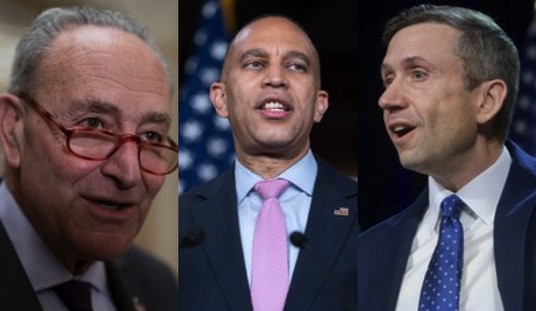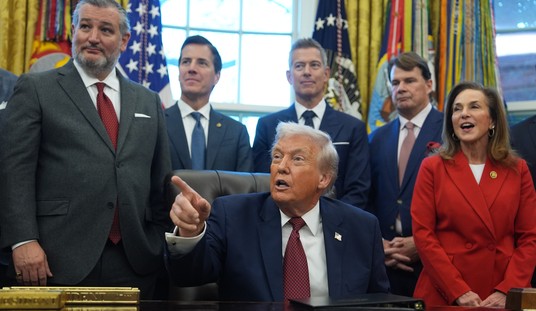
Where is Cleavon Little when you really need him?
I posted just a bit earlier on what looks like a tsunami of panic (hopefully justified) that is building on the left over the impending release of the memo developed by the House Intelligence Committee and now declassified by the White House.
Today, Nancy Pelosi demanded that Devin Nunes be fired…not sure how all that works but whatever. But the nuttiest reaction came from Oregon’s Ron Wyden.
Wyden is basically a progressive who has so civil liberties leanings. He’s probably most famous for getting James Clapper to perjure himself in Senate hearing:
Wyden: “I hope we can do this in just a yes or no answer, because I know Sen. Feinstein wants to move on. Last summer, the NSA director (Keith Alexander) was at a conference and he was asked a question about the NSA surveillance of Americans. He replied, and I quote here, ‘The story that we have millions, or hundreds of millions, of dossiers on people is completely false.’ The reason I’m asking the question is, having served on the committee now for a dozens years, I don’t really know what a dossier is in this context. So, what I wanted to see if you could give me a yes or no answer to the question: Does the NSA collect any type of data at all on millions, or hundreds of millions of Americans?”
Clapper: “No, sir.”
Wyden: “It does not?”
Clapper: “Not wittingly. There are cases where they could inadvertently, perhaps, collect, but not wittingly.”
Wyden knew the answer to the question, he’d discussed it beforehand in a closed session with Clapper, and he sandbagged Clapper in public testimony. This proved Wyden was no a terribly serious person, that Clapper would lie if it suited his purposes, and that perjuring yourself before Congress is really not a big deal.
This is Wyden’s take:
If the White House releases this memo over the FBI’s objection, I don’t want to hear another word from these people about how pervasive secrecy is necessary for national security.
— Ron Wyden (@RonWyden) January 31, 2018
If this memo comes out, I have a long list of less sensitive, but still classified, information that the American people deserve to see. #secretlaw
— Ron Wyden (@RonWyden) January 31, 2018
Remember when we were told a program that collected millions of innocent Americans’ telephone records couldn’t be revealed to the public?
— Ron Wyden (@RonWyden) January 31, 2018
The Director of National Intelligence won’t tell us if #FISA702 can be used to collect communications the government KNOWS are entirely domestic. But the administration may release a memo the FBI says jeopardizes national security.
— Ron Wyden (@RonWyden) January 31, 2018
The Trump administration is trying to make sure the Torture Report never sees the light of day, but the administration may release information the FBI says jeopardizes national security.
— Ron Wyden (@RonWyden) January 31, 2018
The Trump administration won’t tell Americans WHO can be spied on under #FISA702, but it may release information the FBI says jeopardizes national security.
— Ron Wyden (@RonWyden) January 31, 2018
It’s not that the government is always right or always wrong about secrecy. It's that Americans would be right to see this release as proof that selective classification is used more often to deceive them than to protect them.
— Ron Wyden (@RonWyden) January 31, 2018
As Glenn Greewald says, this is bluster:
As whistleblowers have gone to prison, Ron Wyden has been playing this game for years where he hints, winks & coyly offers clues of what he claims is massive, serious, high-level surveillance abuses – as though it's a game of charades – but refuses to tell the public what it is. pic.twitter.com/a9wklwXNco
— Glenn Greenwald (@ggreenwald) February 1, 2018
Even if he wanted to do so, and could manage a majority of his committee to go along with him, the Senate does not have rules that permit that body to declassify documents. Only the House does (why? I have no idea, it just is).
I’d be among the first to say that there is too much secrecy in government. I know when I was a Pentagon staff officer I mastered weaving extraneous classified material into ordinary documents because classified memos got more attention and they were exempt from FOIA. There is nothing in a summary memo, particularly one crafted by intelligence professionals, that is going to give very much away. The memo has been reviewed and no one is even claiming there is anything dangerous, they are focusing on “misleading.”
Notable that in the latest round of FBI/DOJ objections to the release of the House intel memo, earlier claims of dangerous disclosures of sources & methods have vanished.
— Brit Hume (@brithume) January 31, 2018
But this does serve to underscore the desperation of the Democrats to keep the memo secret. And that, alone, is more than enough reason to make it public.













Join the conversation as a VIP Member